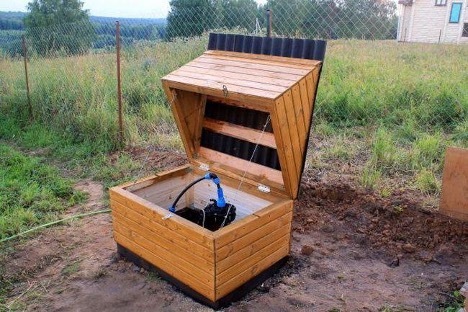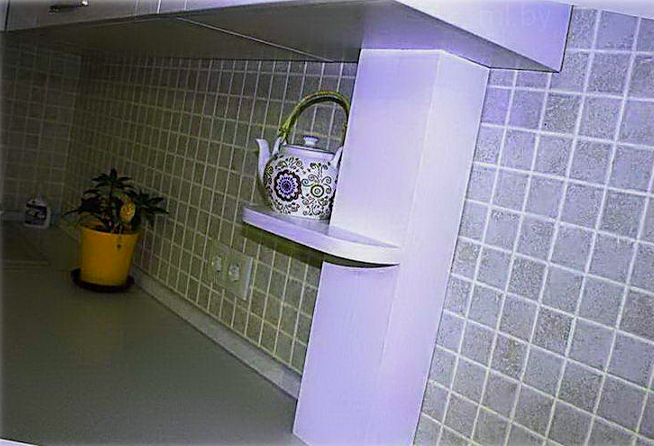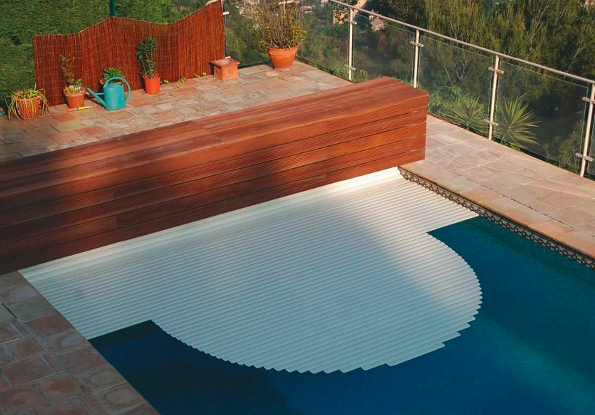vibrating plate - This is a special device, which is a self-propelled construction machine. It has a flat working surface that vibrates intensely due to the movements of an electric, gasoline or diesel engine. Thanks to this, sand or other bulk materials are well compacted, and the surface is even. The main types of equipment and recommendations for its selection are described in this material.
The content of the article
- Description and principle of operation
- Types of vibrating plate
- Other selection criteria
Description and principle of operation
We can say about the vibrating plate that it is a tool for the effective compaction of sand, gravel or other bulk materials. Outwardly, it resembles a small road roller. At the heart of the unit is a working plate. A motor frame, a centrifugal clutch, the motor itself and a vibrator are mounted on it.
The main elements are enclosed in a cylindrical metal case. The motor frame is mounted on shock absorbers. An engine powered by electricity, gasoline or an engine is installed to it. It is he who defines what a vibrating plate is. The energy of the engine is transferred to the shaft where the centrifugal clutch is installed. It rotates at a frequency of about 2200 revolutions every minute.

By transmission, the torque is applied to the vibrator shaft and then to the working flat surface. It vibrates intensively, interacting with bulk material. Therefore, we can say about the vibrating plate that this is a device that compacts sand, gravel, gravel due to the intensive operation of the engine.
Some devices also have a water tank. This makes the weight of the vibrating plate heavier, but it allows you to immediately irrigate the treated surface. Also, the device can be equipped with shock-absorbing mats, gloves and other elements, thanks to which the operator's work becomes more comfortable.
Types of vibrating plate
To understand how to choose a vibrating plate, you need to understand what types of devices are. Depending on the features of the device, you can understand why you need a vibrating plate of one type or another. There are 4 weight categories:
- Up to 90 kg - These are light machines that are used for domestic purposes, as well as in agricultural work.
- Lungs - weighing in the range from 90 to 200 kg. The equipment is used for laying coarse soil, for example, from gravel, as well as asphalt.
- Medium - within 200-500 kg. They are used for processing coarse-grained soil, including compacting large layers.
- Heavy - weighing from 500 kg. Used for strong surface compaction.
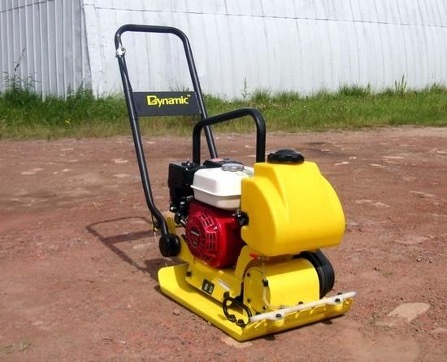
When choosing, you need to understand the principle of operation of the vibrating plate and its purpose. For example, for a layer up to 15 cm, you can use light models. If you need to lay 20-25 cm, light and medium devices will do. If the layers are large, from 30 to 60 cm, a heavy machine is definitely needed.
The unit may have one or more shafts. Depending on this, 2 more types are distinguished:
- single-shaft (moves only forward);
- reversible (several shafts, can move forward and backward).
Depending on the type of engine, 3 more types are distinguished:
- Petrol - a universal model with high performance and at the same time an affordable price. The rating of the best models of a gasoline vibrating plate includes several different options that can be used in everyday life and for professional purposes.
- Diesel - it is not so common compared to gasoline. Used to save fuel.
- Electrical - the most affordable model. And it can also be used indoors.
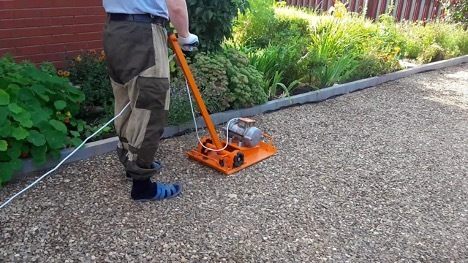
It is also useful to figure out which is better - a vibrating plate or a vibrating leg. The latter are designed for ramming in a hard-to-reach place, for example, in a small trench. Its working surface is smaller than that of a vibrating plate, and the compaction is much more intensive. We can say that both tools are useful, but for different types of work.
Another point: which is better - a vibrating plate or a vibrorammer. In the latter case, the engine communicates not a vibrating, but a pushing motion in the direction of the surface. Therefore, the impact intensity is much higher, although the cultivated area is smaller. Such equipment can also be used in hard-to-reach places. But it is not suitable for laying tiles, asphalt and compacting clay soil.
Other selection criteria
The choice of a vibrating plate should be made taking into account other parameters:
- The presence of a wheel pair - it will be much easier to move such equipment.
- The folding handle is another important feature of the vibrating plate. The presence of a handle makes it easy to transport the device.
- Irrigation system - it is not available everywhere, but it is desirable that such equipment be available. The system irrigates asphalt or other surface. There are only some types of vibrating plates.
- Protective cover - to prevent the ingress of dirt, stones, sand and other materials. There is a vibrating plate and a vibroleg.

It is also recommended to pay attention to the characteristics of the gasoline vibrating plate. First of all, this is power, engine type, its cycle time and tank volume. A very important parameter is the depth of compaction and the dimensions of the plate itself. According to these indicators, you can see the differences between a vibrating rammer and a vibrating plate.
Among the technical characteristics of the vibrating plate, power is of particular importance. This parameter is measured in watts and horsepower. For example, for a sufficiently good compaction depth of 350 mm, a vibratory plate power in the range of 4500-4800 W is required. For domestic purposes, you can use less productive devices.
The choice of a vibrating plate for tamping can also be carried out taking into account the manufacturer's brand. Judging by the reviews and technical specifications, the best representatives are:
- Amman;
- Zitrek;
- champion;
- Elitech;
- DDE;
- RedVerg and others.
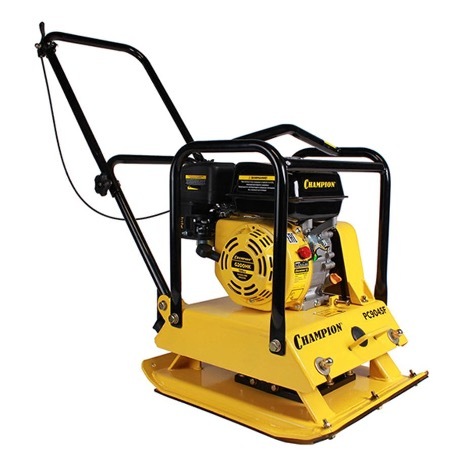
Thus, you can choose a suitable device depending on its purpose, layer depth, required power. If we talk about which vibrating plate is better to buy for asphalt, these are light and medium models weighing 90-120 kg. If maximum compaction of large layers of 30-60 cm is required, one should stop at heavy models. It is also necessary to take into account the power, type of engine and the presence of additional accessories.
